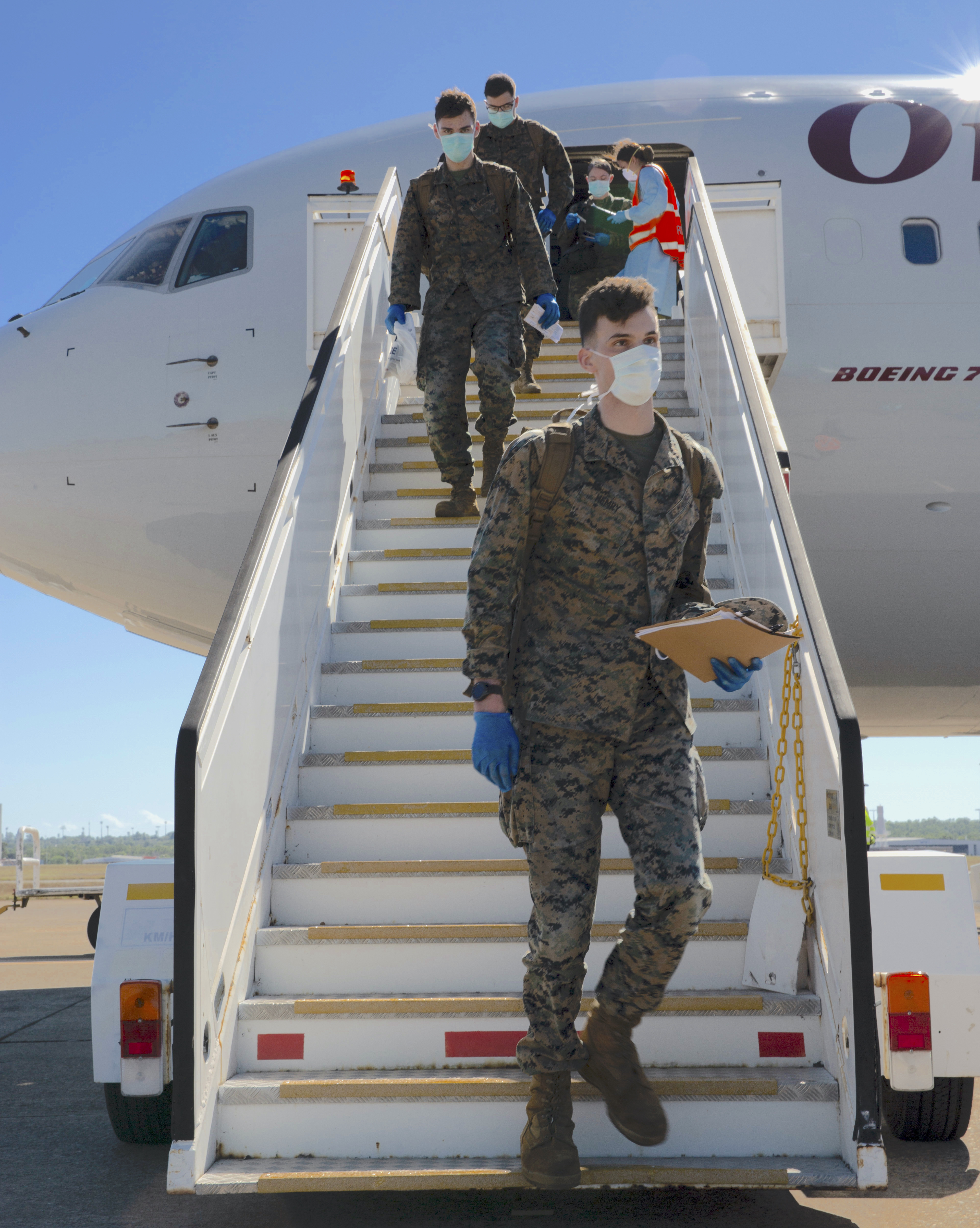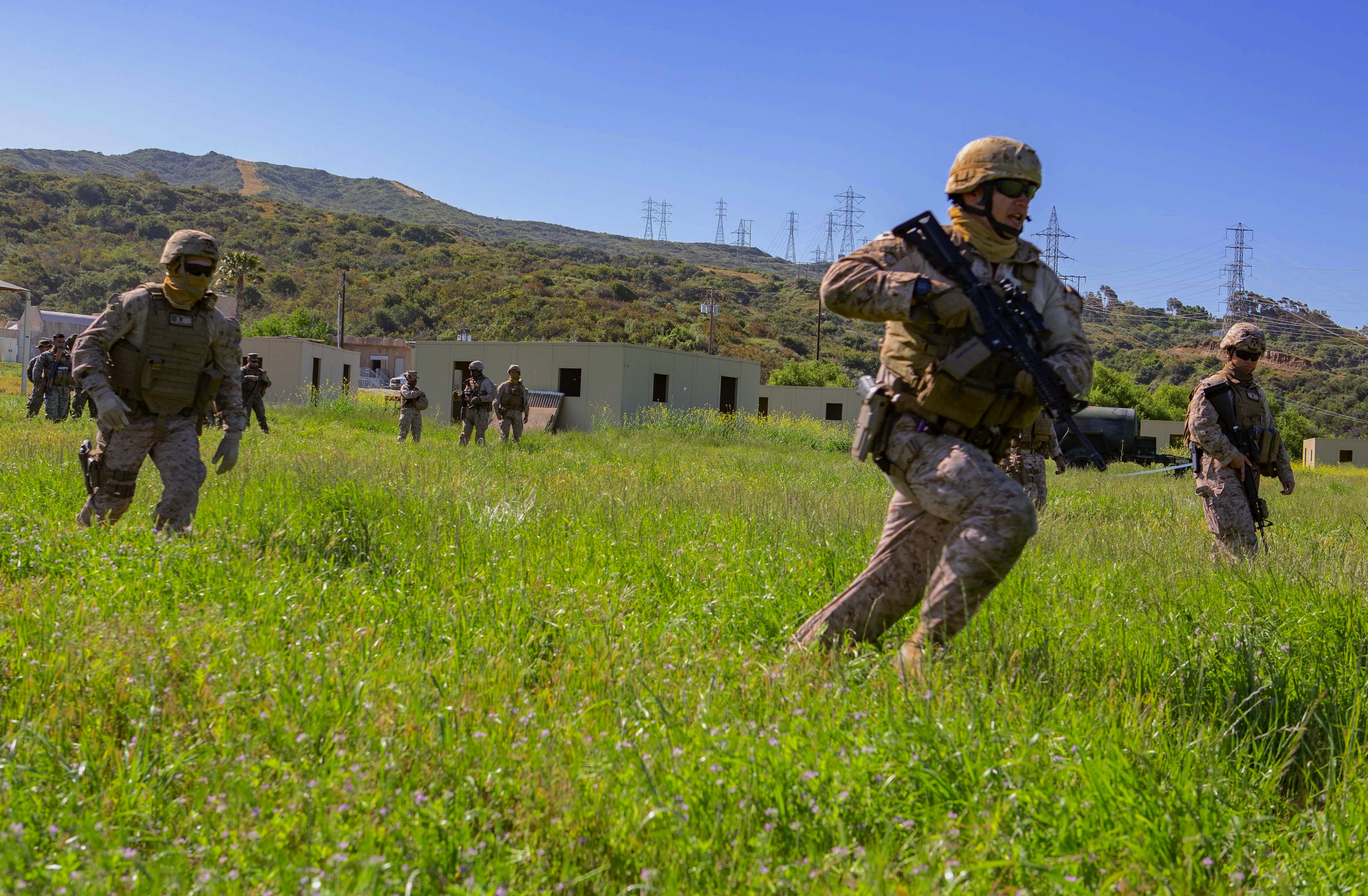
Marines are on the move this week, with the latest contingent arriving in Australia for the resumption this summer of the rotational forces to Darwin and the command element of the 13th Marine Expeditionary Unit taking the helm of a Middle East-based response force.
About 200 Marines landed at Royal Australian Air Force Base Darwin in recent days to join Marine Response Force-Darwin, which after mandatory 14-day quarantines “will grow to 1,200 personnel over the next eight weeks and will train through to September,” the Australian Defense Force said in an announcement. The deployment “will finish with the signature MRF-D/ADF bilateral high-end warfighting activity, Exercise Koolendong.”
“All Marines were biosecurity screened and COVID-19 tested on arrival ahead of a 14-day quarantine at Defence facilities in Darwin,” the ministry said. “The Marines will be tested again for COVID-19 before exiting quarantine.”
While the United States has recorded the highest rate of infection, Australia has reported low rates of COVID-19 infections, with 7,221 reported cases and only 102 deaths as of Tuesday, according to the Johns Hopkins University of Medicine’s online global database. No deaths but 29 cases of infections have been reported in the Northern Territory, home to Darwin.
Group Capt. Stewart Dowrie, who heads Australian Defense Force’s Northern Command, told reporters “there will be a heavy presence of Australians (soldiers) and we have invited Northern Territory police and health officers to come and supervise quarantine,” the Riverine Herald newspaper reported. “Subsequent to the first 200 being released there will be more U.S. Marine Corps people who can also assist in the supervision.”
“I have no doubt the United States Marine Corps are a highly disciplined workforce,” Dowrie said, adding that any breaches of quarantine would be dealt with by “both disciplinary measures and action by health authorities,” the newspaper reported.
The 1,200 Marines slated for this year’s rotation is about half of the 2,500 who deployed last year in line with the maximum MRF-D force levels agreed upon by both countries.
Linda Reynolds, the Australia defense minister, called the Marine Response Force “an important initiative that deepens interoperability between the Australian Defence Force and the US military,” said “Australia’s alliance with the United States is our most important Defence relationship. It sends a clear signal about our commitment to the security and stability of our region.”
Reynolds credited “extensive planning and coordination” with enabling the resumption of MRF-D units, noting “the fact that we were able to modify MRF-D and mitigate risks associated with COVID-19 to allow it to proceed is a strong testament of the resilience of our alliance.”
The scheduled deployments of Marines to Darwin began earlier this year but was interrupted and, in late March, was delayed when the Pentagon ordered travel restrictions due to the novel coronavirus pandemic. Marine Corps Forces Pacific officials last month announced the rotations would restart, noting “the decision to resume the deployment comes as the government of Australia is granting an exemption to current travel restrictions to allow the 2020 MRF-D rotation to proceed, based on Australia’s record to date in managing impacts from COVID-19 as well as strict adherence by deployed U.S. Marines to the mandatory 14-day quarantine and other requirements.”

Meanwhile, the 13th MEU commander, Col. Andrew T. Priddy, took the helm of Special Purpose Marine Air-Ground Task Force Crisis Response-Central Command 20.2 at Al-Jaber Air Base in Kuwait, officials announced Monday. The Camp Pendleton, Calif.-based unit now has the lead responsibility as the go-to force for U.S. Marine Corps Forces and U.S. Central Command, providing quick responses to crises and contingencies in the Middle East and working with partners and allies in theater security cooperation exercises and events in the region.
“We remain postured to respond to any crisis throughout the U.S. Central Command area of responsibility,” Priddy said in a I Marine Expeditionary Force news release. ”While maintaining this crisis response capability, we look forward to continuing to advance the regional partner relationships across the” region.
The SPMAGTF deployment is a “dirt” deployment for the “Fighting 13th” MEU, which in February 2019 had returned from an overseas shipboard deployment with the Essex Amphibious Ready Group. The MEU includes 2nd Battalion, 5th Marine Regiment, and Combat Logistics Detachment 25 – both based at Camp Pendleton – and Marine Medium Tiltrotor Squadron-166 (Reinforced), which is based at Miramar Marine Corps Air Station, Calif.
Marines with those units have spent recent months training at Camp Pendleton and elsewhere in preparation for the deployment. “Across the command, Marines and sailors have trained extensively for this mission,” Sgt. Maj. Stuart D. Glass, the 13th MEU’s senior enlisted leader, said in the announcement. “Our forward-deployed forces are ready to respond to any crisis or event at a moment’s notice.”





